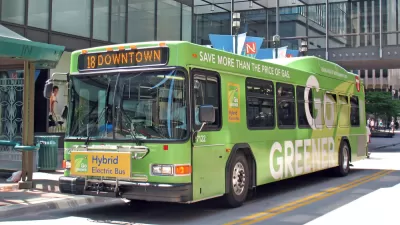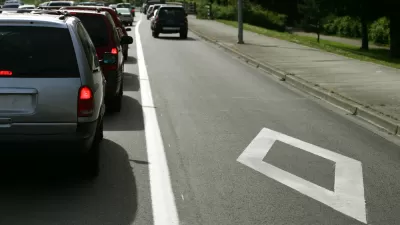The auto may no longer be "the quintessential symbol of American mobility, status and independence," opines Robert J. Samuelson for The Washington Post, as the latest demographic and auto ownership data point to a change in American mobility.

"Now there are signs that the car and its many offshoots (SUVs, pickup trucks) are losing their grip on the American psyche and pocketbook," writes Samuelson, economics columnist for The Post.
The car culture may be dying or, at any rate, slumping into a prolonged era of eclipse. The only question is whether the signs of change can be believed. It’s not clear.
Clearly SUVs and light trucks have not lost favor with American passenger vehicle consumers, as 2015 sales numbers show. Samuelson's observations do appear to hold up, though, for compact cars, hybrids, and electric vehicles, sadly (from an environmental perspective), as "crossovers replace the family car."
Fewer drivers
"Just recently, the Federal Highway Administration (FHWA) published figures — first reported on the Atlantic magazine’s CityLab website — indicating that the number of licensed drivers 16 or younger in 2014 had dropped 37 percent since 2009 and, at 1.08 million, was 'the lowest number since the 1960s," writes Samuelson.
More impressive, the trend seems long term. A report from the Highway Loss Data Institute [supported by the auto insurance industry] cites studies showing that from 1983 to 2010 the share of 16-year-olds with a license fell from 46 percent to 28 percent; over the same period, the share of licensed 17-year-olds declined from 69 percent to 46 percent .
"It's not only young adults who are delaying in getting drivers licenses, but a drop in licenses among [almost] all age groups according to a new analysis of license data from 1983-2014 by the University of Michigan Transportation Research Institute," notes a January post here. "The only age group to show a slight increase (in drivers licenses) since 2008 is the 70-and-older crowd," according to UMTRI."
Auto ownership
Samuelson provides various reasons for the decline in youths with drivers licenses, debated here as well, and points to "a new study by Federal Reserve economists Christopher Kurz, Geng Li and Daniel Vine...[that] suggests that most potential young buyers couldn’t afford a new vehicle or didn’t want to incur the debt and operating expenses of doing so. Economic considerations dominated." Of course, there's a major difference between getting a license and owning a motor vehicle.
Whether it be economic or cultural, the trends are pointing to a lessening in the nation's systemic auto addiction. But Samuelson ends on a sober tone.
"We simply don’t know," he writes, referring to the future of American mobility.
What we do know is that we are, to a large extent, prisoners of the past. The car created today’s residential geography, and it cannot be repealed simply or swiftly.
Hat tip to Kenyon Karl.
FULL STORY: Opinions: Is the car culture dying?

Maui's Vacation Rental Debate Turns Ugly
Verbal attacks, misinformation campaigns and fistfights plague a high-stakes debate to convert thousands of vacation rentals into long-term housing.

Planetizen Federal Action Tracker
A weekly monitor of how Trump’s orders and actions are impacting planners and planning in America.

San Francisco Suspends Traffic Calming Amidst Record Deaths
Citing “a challenging fiscal landscape,” the city will cease the program on the heels of 42 traffic deaths, including 24 pedestrians.

Defunct Pittsburgh Power Plant to Become Residential Tower
A decommissioned steam heat plant will be redeveloped into almost 100 affordable housing units.

Trump Prompts Restructuring of Transportation Research Board in “Unprecedented Overreach”
The TRB has eliminated more than half of its committees including those focused on climate, equity, and cities.

Amtrak Rolls Out New Orleans to Alabama “Mardi Gras” Train
The new service will operate morning and evening departures between Mobile and New Orleans.
Urban Design for Planners 1: Software Tools
This six-course series explores essential urban design concepts using open source software and equips planners with the tools they need to participate fully in the urban design process.
Planning for Universal Design
Learn the tools for implementing Universal Design in planning regulations.
Heyer Gruel & Associates PA
JM Goldson LLC
Custer County Colorado
City of Camden Redevelopment Agency
City of Astoria
Transportation Research & Education Center (TREC) at Portland State University
Jefferson Parish Government
Camden Redevelopment Agency
City of Claremont




























